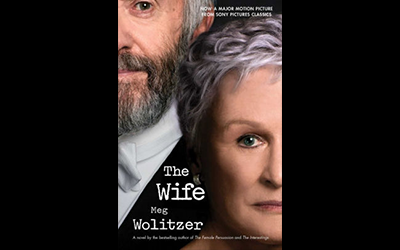
The Wife: a Novel by Meg Wolitzer
When I first saw the trailer for 'The Wife,' I definitely wasn't interested. Frustrated woman writer who gives up her ambitions to support her husband's? No thanks. Luckily my curiosity to see what Glenn Close could do with the role won me over. Close's gracefully controlled restraint and the buildup to the surprise ending rightfully won her the Golden Globe for Best Actress and, if there is any justice in the universe, will give her the Oscar as well. That's my plug for the movie.
Which led me, belatedly, to discover Meg Wolitzer. It's shameful what I haven't read, but now I can add another to the list of writers I need to catch up on. Wolitzer sweeps us into the action of the book with exact, tactile descriptions – on a plane, mothers hand out 'little plastic bags of Cheerios with dusty sediment at the bottom' – and her wit is ferocious. The main character Joan opens The Wife with a startling revelation that the movie holds back, so I'll leave it for you to discover. Joan's caustic observations of academia and writing programs in particular are spot-on and hilarious, as are her takedowns of male ego. Joan's husband is 'one of those men who own the world. You know the type I mean: those advertisements for themselves, those sleepwalking giants, roaming the earth and knocking over other men, women, furniture, villages. Why should they care? They own everything, the seas and mountains, the quivering volcanoes, the dainty, ruffling rivers.'
Beginning in the 1950s, with men mostly controlling the access to publishing and success, and academia mostly extolling male writers, The Wife sketches out the differences between men's 'armored,' 'muscle-bound' writing and women's more intimate, personal stories. As a college student, Joan meets a successful woman writer early in the story and takes her bitterness and scorn to heart. 'I didn't want to play in the same field as the men; it would never be comfortable, and I couldn't compete. My world wasn't big enough, wide enough, dramatic enough, and my subjects were few. I knew my limits.' Joan falls in love with her writing professor; he divorces his wife and marries her, and that becomes the subject of his first novel.
Resigned to be the helpmate, Joan accompanies her husband to readings where he is adored, applauded, and flirted with. His career takes off, stagnates, and then culminates in a top literary prize. Joan endures and observes – but neither Glenn Close's performance or Meg Wolitzer's prose leave us to believe that Joan finally accepts her limits. I won't spoil the ending, but whether you see the movie or read the book, you'll be shocked by the power behind the seemingly passive wife.
by Jan Hardy, Cataloging Specialist
